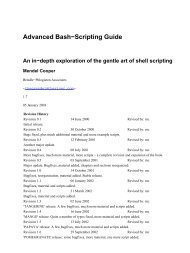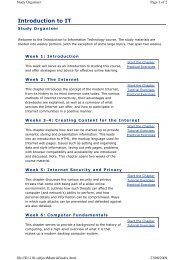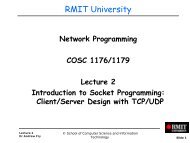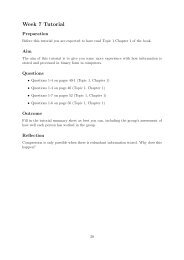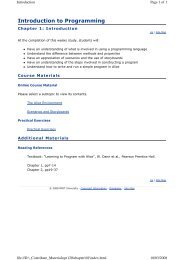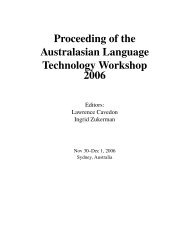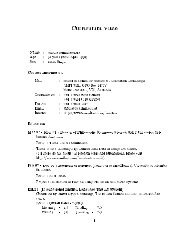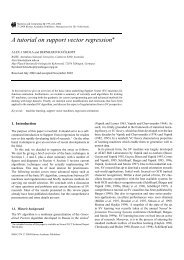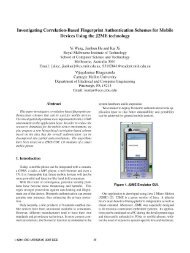Fast and Flexible Word Searching on Compressed ... - RMIT University
Fast and Flexible Word Searching on Compressed ... - RMIT University
Fast and Flexible Word Searching on Compressed ... - RMIT University
Create successful ePaper yourself
Turn your PDF publications into a flip-book with our unique Google optimized e-Paper software.
124 • E. S. de Moura et al.<br />
Table II. Compressi<strong>on</strong> Ratios Achieved by Different Compressi<strong>on</strong> Schemes, where<br />
“Entropy” Refers to Optimal Coding. The space used to store the vocabulary is included in<br />
the Huffman compressi<strong>on</strong> ratios.<br />
Method<br />
AP WSJ DOE ZIFF FR<br />
Entropy 26.20 26.00 24.60 27.50 25.30<br />
Binary Huffman 27.41 27.13 26.25 28.93 26.88<br />
Plain Huffman 31.16 30.60 30.19 32.90 30.14<br />
Tagged Huffman 34.12 33.70 32.74 36.08 33.53<br />
Gzip 38.56 37.53 34.94 34.12 27.75<br />
Compress 43.80 42.94 41.08 41.56 38.54<br />
1 2. This effect gets worse if instead of bits we use numbers in base d. We<br />
give now an upper bound <strong>on</strong> the compressi<strong>on</strong> inefficiency involved.<br />
In the worst case, Huffman will encode each symbol with probability p i<br />
using ⎡log d1 p i⎤ digits. This is a worst case because some symbols are<br />
encoded using ⎣log d1 p i⎦ digits. Therefore, in the worst case the average<br />
length of a codeword in the compressed text is<br />
v<br />
<br />
i1<br />
Files<br />
v<br />
pi ⎡logd1p i⎤ 1 pi logd1p i<br />
i1<br />
which shows that, regardless of the probability distributi<strong>on</strong>, we cannot<br />
spend more than <strong>on</strong>e extra digit per codeword due to rounding overheads.<br />
For instance, if we use bytes we spend at most <strong>on</strong>e more byte per word.<br />
This proves that the compressi<strong>on</strong> ratio will not degrade as the text grows,<br />
even when the number of different words <str<strong>on</strong>g>and</str<strong>on</strong>g> separators increases.<br />
Table II shows the entropy <str<strong>on</strong>g>and</str<strong>on</strong>g> compressi<strong>on</strong> ratios achieved for binary<br />
Huffman, plain Huffman, tagged Huffman, Gnu Gzip, <str<strong>on</strong>g>and</str<strong>on</strong>g> Unix Compress<br />
for the files of the TREC collecti<strong>on</strong>. As can be seen, the compressi<strong>on</strong> ratio<br />
degrades <strong>on</strong>ly slightly by using bytes instead of bits, <str<strong>on</strong>g>and</str<strong>on</strong>g> in that case we<br />
are still below Gzip. The excepti<strong>on</strong> is the FR collecti<strong>on</strong>, which includes a<br />
large part of n<strong>on</strong>natural language such as chemical formulas. The compressi<strong>on</strong><br />
ratio of the tagged Huffman code is approximately 3 points (i.e., 3% of<br />
u) over that of plain Huffman, which comes from the extra space allocated<br />
for the tag bit in each byte.<br />
3.3 Compressi<strong>on</strong> <str<strong>on</strong>g>and</str<strong>on</strong>g> Decompressi<strong>on</strong> Performance<br />
Finally, we c<strong>on</strong>sider in this secti<strong>on</strong> the time taken to compress <str<strong>on</strong>g>and</str<strong>on</strong>g><br />
decompress the text.<br />
To compress the text, a first pass is performed in order to collect the<br />
vocabulary <str<strong>on</strong>g>and</str<strong>on</strong>g> its frequencies. By storing it in a trie data structure, Ou<br />
total worst-case time can be achieved. Since a trie requires n<strong>on</strong>practical<br />
amounts of memory, we use a hash table to perform this step in our<br />
implementati<strong>on</strong>. The average time to collect the vocabulary using a hash<br />
ACM Transacti<strong>on</strong>s <strong>on</strong> Informati<strong>on</strong> Systems, Vol. 18, No. 2, April 2000.



